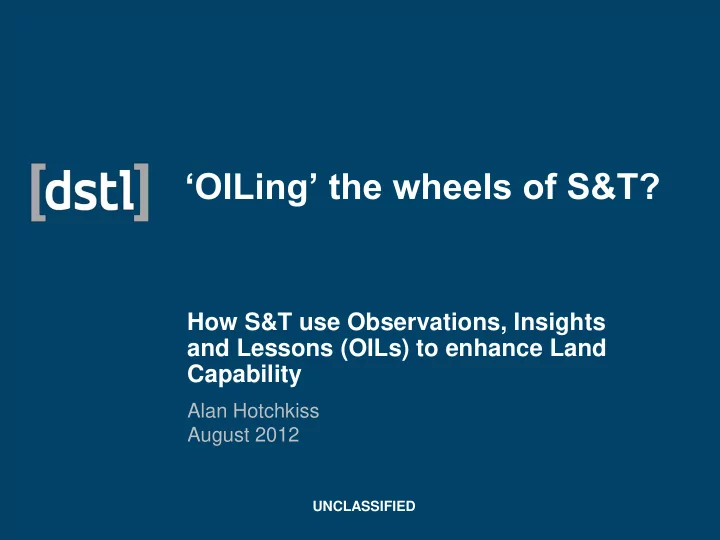

‘OILing’ the wheels of S&T? How S&T use Observations, Insights and Lessons (OILs) to enhance Land Capability Alan Hotchkiss August 2012 UNCLASSIFIED
OILs Observations - describe the conditions experienced by military forces during war or training. Example: "The daily average temperature in Iraq country was 110 degrees, and it had a negative effect on troops and equipment." Insights - describe the issues that arose while conducting military operations or training. Example: "Due to the extreme heat experienced in Iraq, the (insert piece of equipment) failed to operate properly." Lessons - potential solutions to the problems experienced under set military conditions (for example, extreme heat). Example: "By doing ... X, ... our equipment continued to work despite the extreme heat." Center for Army Lessons Learned (CALL) Dstl is part of the UNCLASSIFIED Ministry of Defence
What is a lesson? “ A lesson is an experience, example, or observation that imparts beneficial new knowledge or wisdom. It is something that can be analysed to produce recommendations and / or actions .” UK Defence Instruction Notice (2011) Dstl is part of the UNCLASSIFIED Ministry of Defence
Background (Ops based in Iraq and Afghanistan) Dstl Land Operations LORST Research for Dstl/QinetiQ Science & Operational Technology Observations for Science & OOST Technology QinetiQ Operational Issues OpIss4R For Research Dstl is part of the UNCLASSIFIED Ministry of Defence
OOST – Aim To gather Observations, Insights and Lessons (OILs) from operations and training and exploit these across the Science and Technology (S&T) and wider MoD community to support them in their roles to enhance UK capabilities. Dstl is part of the UNCLASSIFIED Ministry of Defence
OOST – Scope Land-centric (but touches on other services) Current focus on operations Increasing focus on OILs from training Focussed on use for S&T Dstl is part of the UNCLASSIFIED Ministry of Defence
OOST Process Demand Capture Analysis Exploitation S&T Programme formulation Rapid Operations Analysis Thematic Stakeholder Current Ops Training Requirements Analysis (LXC, PJHQ, DE&S) Historical Experiments Analysis S&T Studies Informing wider FD Dstl is part of the UNCLASSIFIED Ministry of Defence
OOST Process Demand OOST Stakeholders MOD Unified Industry and Dstl Customer Academia Army HQ Departments Roke PJHQ Programme Office Sea DE&S Science Gateways MOD Centre Dstl is part of the UNCLASSIFIED Ministry of Defence
OOST Process Capture Post Operational Interviews (POIs) – Cognitive interviewing – 1 to 1 interviews or small groups – Structured process – Across all Defence Lines of Development – OILs gathered from all organisational levels Dstl is part of the UNCLASSIFIED Ministry of Defence
OOST Process Interview Techniques • Established technique, originally developed to improve police interview methods • Focuses on two major components of witness testimony – Memory and Communication • The goal of the interview is to assist the witnesses to access information. • The interview, therefore is directed by the responses of the witnesses Dstl is part of the UNCLASSIFIED Ministry of Defence
OOST Process Interview Techniques • The interviews do not have a set of predetermined questions • Interviewers must be flexible enough to use good judgement and change directions if required • The cognitive interview enhances communication by – Helping the witness to formulate a complete, intelligible response – Helping the interviewer to comprehend and record the witness response Dstl is part of the UNCLASSIFIED Ministry of Defence
OOST Process Capture Other information sources: – Post Operational Reports (PORs) – Web-blogs – News websites, etc. Dstl is part of the UNCLASSIFIED Ministry of Defence
OOST Process Rapid Analysis – Tour by Tour Basis Interview undertaken OILs drawn out Key Insights identified Headlines distributed in 3 days Summary report to all stakeholders Dstl is part of the UNCLASSIFIED Ministry of Defence
OOST Process Med/Long term Analysis – Enduring OILs Thematic Analysis Historical Analysis • General thematic Analysis • Telic & HERRICK Enduring OILs • Focussed thematic • S&T themes Analysis • S&T themes (per tour) • Pan DLoD Dstl is part of the UNCLASSIFIED Ministry of Defence
OOST Process Exploitation Push Pull Communicated to Requests from stakeholders via: stakeholders: • Rapid communications, • Requests for Headline emails, Information (RFIs) reports • Requests for thematic • Presentations and analysis briefs to teams, departments and other stakeholders • Online e.g. LXC, HQ Infantry and Dstl Intranet sites Dstl is part of the UNCLASSIFIED Ministry of Defence
OOST Process Exploitation Support to:- Research linked to Support to Operations e.g. Base Dead Ground Base Protection UOR business cases, Equipment Programme S&T programme formulation Soldier Load Reference Model (SLRM) Dstl is part of the UNCLASSIFIED Ministry of Defence
OOST Process Exploitation “ The work from OOST is vital for ITDU, the Army and wider MoD organisations. The outputs of the work are used to update information regarding soldier burden contained within the Soldier Reference Centre (SRC)….” SO2 Soldier Systems, LWC Dstl is part of the UNCLASSIFIED Ministry of Defence
Ensuring best practice Actively seek regular stakeholder feedback Attendance at workshops and conferences, UK MOD lessons community, e.g. Lessons JALLC NATO Lessons Learned Exploitation Centre, Maritime and Air Warfare Conference (Oct’12) Centres and Permanent Joint HQ International lessons community, e.g. US and NATO lessons centres Dstl is part of the UNCLASSIFIED Ministry of Defence
The Future H16-18 Dstl is part of the UNCLASSIFIED Ministry of Defence
HERRICK drawdown Focus on current issues Increase training and experimentation OILs Widen stakeholder audience Dstl is part of the UNCLASSIFIED Ministry of Defence
Dstl is part of the UNCLASSIFIED Ministry of Defence
Questions? “ The further backwards you look, the further forward you can see” Winston Churchill Dstl is part of the UNCLASSIFIED Ministry of Defence
Recommend
More recommend